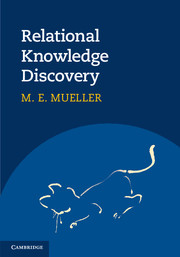9 - The logic of knowledge
Published online by Cambridge University Press: 05 July 2012
Summary
If we assume knowledge to be what it takes to make rational decisions, then knowledge is not logic. It is not even logic when we assume it is representable in an information system.
Many decisions (and every answer to a question is a decision) are far from being discrete, deterministic, or deductively comprehensible.
Yet, the simplest question we can ask is, “Is x equal to y?” And it takes knowledge in the form of the ability to discern different things from each other to decide whether one should answer “Yes” or “No”.
During the last decades, machine learning evolved from theories of reasoning in artificial intelligence to an essential component of software systems. Statistical methods outperform logic-based approaches in most application domains – and with increasing computational power it has become possible to generate and test classifiers. As a more sophisticated approach, ensemble learning implements divide-and-conquer strategies on the learning problem. With the further increase of data collections (e.g., data warehouses), the problem we are facing is not concerned with how we can induce a classifier that supports our model assumptions on the data but rather to understand what kind of information there actually is. In machine learning, this approach is known as knowledge discovery.
Knowledge representation
Because we are used to describing knowledge in the language of terminologic logic, we quite often identify knowledge representation with logic models. In Chapter 3 we saw that knowledge can be represented in many, many different ways.
- Type
- Chapter
- Information
- Relational Knowledge Discovery , pp. 251 - 257Publisher: Cambridge University PressPrint publication year: 2012



